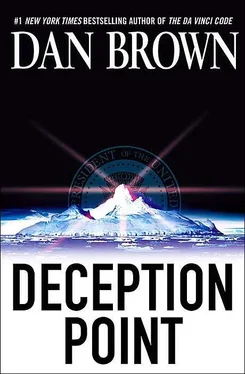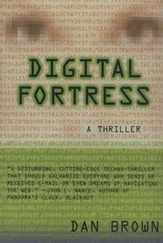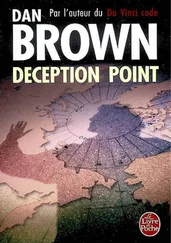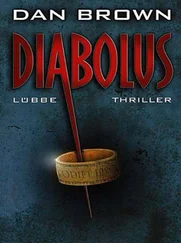“The fat-body sub stationed off the coast here? We were wondering why you didn’t mention it to us.”
Ekstrom glanced up. “I’m sorry?”
“The submarine, sir? You could have at least told the guys on radar. Additional seaboard security is understandable, but it took our radar team off guard.”
Ekstrom stopped short. “What submarine?”
The technician stopped now too, clearly not expecting the administrator’s surprise. “She’s not part of our operation?”
“No! Where is it?”
The technician swallowed hard. “About three miles out. We caught her on radar by chance. Only surfaced for a couple minutes. Pretty big blip. Had to be a fat-body. We figured you’d asked the navy to stand watch over this op without telling any of us.”
Ekstrom stared. “I most certainly did not!”
Now the technician’s voice wavered. “Well, sir, then I guess I should inform you that a sub just rendezvoused with an aircraft right off the coast here. Looked like a personnel change. Actually, we were all pretty impressed anyone would attempt a wet-dry vertical in this kind of wind.”
Ekstrom felt his muscles stiffen. What the hell is a submarine doing directly off the coast of Ellesmere Island without my knowledge? “Did you see what direction the aircraft flew after rendezvous?”
“Back toward Thule air base. For connecting transport to the mainland, I assume.”
Ekstrom said nothing the rest of the way to the PSC. When he entered the cramped darkness, the hoarse voice on the line had a familiar rasp.
“We’ve got a problem,” Tench said, coughing as she spoke. “It’s about Rachel Sexton.”
Senator Sexton was not sure how long he had been staring into space when he heard the pounding. When he realized the throbbing in his ears was not from the alcohol but rather from someone at his apartment door, he got up from the couch, stowed the bottle of Courvoisier, and made his way to the foyer.
“Who is it?” Sexton yelled, in no mood for visitors.
His bodyguard’s voice called in with the identity of Sexton’s unexpected guest. Sexton sobered instantly. That was fast. Sexton had hoped not to have to have this conversation until morning.
Taking a deep breath and straightening his hair, Sexton opened the door. The face before him was all too familiar—tough and leathery despite the man’s seventy-something years. Sexton had met with him only this morning in the white Ford Windstar minivan in a hotel parking garage. Was it only this morning? Sexton wondered. God, how things had changed since then.
“May I come in?” the dark-haired man asked.
Sexton stepped aside, allowing the head of the Space Frontier Foundation to pass.
“Did the meeting go well?” the man asked, as Sexton closed the door.
Did it go well? Sexton wondered if the man lived in a cocoon. “Things were terrific until the President came on television.”
The old man nodded, looking displeased. “Yes. An incredible victory. It will hurt our cause greatly.”
Hurt our cause? Here was an optimist. With NASA’s triumph tonight, this guy would be dead and buried before the Space Frontier Foundation attained their goals of privatization.
“For years I have suspected proof was forthcoming,” the old man said. “I did not know how or when, but sooner or later we had to know for sure.”
Sexton was stunned. “You’re not surprised?”
“The mathematics of the cosmos virtually requires other life-forms,” the man said, moving toward Sexton’s den. “I am not surprised that this discovery has been made. Intellectually, I am thrilled. Spiritually, I am in awe. Politically, I am deeply disturbed. The timing could not be worse.”
Sexton wondered why the man had come. It sure as hell wasn’t to cheer him up.
“As you know,” the man said, “SFF member companies have spent millions trying to open the frontier of space to private citizens. Recently, much of that money has gone to your campaign.”
Sexton felt suddenly defensive. “I had no control over tonight’s fiasco. The White House baited me to attack NASA!”
“Yes. The President played the game well. And yet, all may not be lost.” There was an odd glint of hope in the old man’s eyes.
He’s senile, Sexton decided. All was definitely lost. Every station on television right now was talking about the destruction of the Sexton campaign.
The old man showed himself into the den, sat on the couch, and fixed his tired eyes on the senator. “Do you recall,” the man said, “the problems NASA initially had with the anomaly software onboard the PODS satellite?”
Sexton could not imagine where this was headed. What the hell difference does that make now? PODS found a goddamned meteorite with fossils!
“If you remember,” the man said. “The onboard software did not function properly at first. You made a big deal of it in the press.”
“As I should have!” Sexton said, sitting down opposite the man. “It was another NASA failure!”
The man nodded. “I agree. But shortly after that, NASA held a press conference announcing they had come up with a work-around—some sort of patch for the software.”
Sexton hadn’t actually seen the press conference, but he’d heard it was short, flat, and hardly newsworthy—the PODS project leader giving a dull technical description of how NASA had overcome a minor glitch in PODS’s anomaly-detection software and gotten everything up and running.
“I have been watching PODS with interest ever since it failed,” the man said. He produced a videocassette and walked to Sexton’s television, putting the video in the VCR. “This should interest you.”
The video began to play. It showed the NASA press room at headquarters in Washington. A well-dressed man was taking the podium and greeting the audience. The subtitle beneath the podium read:
CHRIS HARPER,
Section Manager
Polar Orbiting Density Scanner Satellite (PODS)
Chris Harper was tall, refined, and spoke with the quiet dignity of a European American who still clung proudly to his roots. His accent was erudite and polished. He was addressing the press with confidence, giving them some bad news about PODS.
“Although the PODS satellite is in orbit and functioning well, we have a minor setback with the onboard computers. A minor programming error for which I take full responsibility. Specifically, the FIR filter has a faulty voxel index, which means the PODS’s anomaly-detection software is not functioning properly. We’re working on a fix.”
The crowd sighed, apparently accustomed to NASA letdowns. “What does that mean for the current effectiveness of the satellite?” someone asked.
Harper took it like a pro. Confident and matter-of-fact. “Imagine a perfect set of eyes without a functioning brain. Essentially the PODS satellite is seeing twenty-twenty, but it has no idea what it’s looking at. The purpose of the PODS mission is to look for melt pockets in the polar ice cap, but without the computer to analyze the density data PODS receives from its scanners, PODS cannot discern where the points of interest are. We should have the situation remedied after the next shuttle mission can make an adjustment to the onboard computer.”
A groan of disappointment rose in the room.
The old man glanced over at Sexton. “He presents bad news pretty well, doesn’t he?”
“He’s from NASA,” Sexton grumbled. “That’s what they do.”
The VCR tape went blank for an instant and then switched to another NASA press conference.
“This second press conference,” the old man said to Sexton, “was given only a few weeks ago. Quite late at night. Few people saw it. This time Dr. Harper is announcing good news.”
Читать дальше











